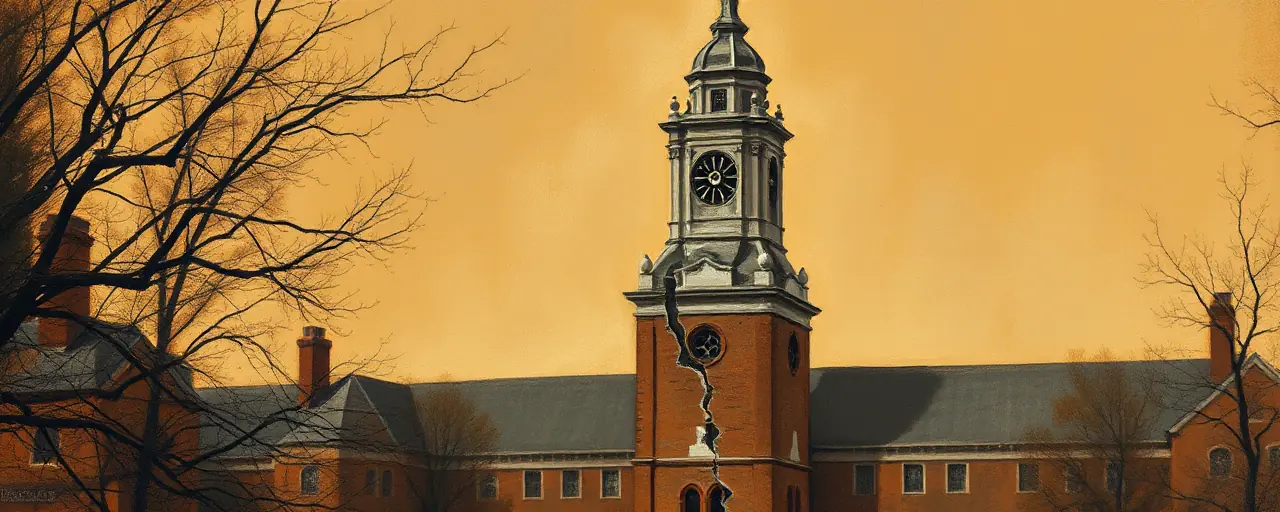A Prestigious Target
Harvard University, a beacon of intellectual rigor, now finds itself in the crosshairs of a federal campaign that feels more like a vendetta than governance. The Department of Homeland Security, led by Secretary Kristi Noem, has slashed over $2.7 million in grants to the institution, accusing it of fostering antisemitism and extremism. This move, announced on April 16, 2025, isn’t just a financial jab; it’s a calculated strike against academic freedom, cloaked in the guise of national security.
The decision landed like a shockwave, not because Harvard is above scrutiny, but because it signals a broader, more insidious trend: the federal government wielding its power to silence dissent and reshape higher education. For those who value open discourse and the pursuit of knowledge, this is a chilling moment. The administration’s actions don’t just punish Harvard; they set a precedent that threatens every university daring to host controversial ideas.
Noem’s scathing letter to Harvard, demanding records on foreign student visa holders’ protest activities by April 30, 2025, or risk losing the ability to enroll international students, reads like a page from an authoritarian playbook. It’s not about accountability; it’s about control. By targeting Harvard, an institution with a $53.2 billion endowment, the administration aims to send a message: no university, no matter how prestigious, is untouchable.
This isn’t about protecting Jewish students or curbing violence, as the administration claims. It’s about leveraging fear to suppress free speech and academic inquiry. Those who champion civil liberties and the right to protest see this for what it is: a dangerous overreach that undermines the very principles universities are meant to uphold.
The Myth of the Untouchable Endowment
Critics of Harvard often point to its massive endowment, arguing it can weather any financial storm. But this oversimplification ignores reality. About 70% of Harvard’s endowment is donor-restricted, earmarked for specific purposes like scholarships or research. The discretionary portion, already stretched thin, can’t replace the $2.7 million in canceled grants, let alone the $2.2 billion in frozen federal funding proposed by President Trump. These funds support critical research and student services, not lavish campus perks.
The National Institutes of Health and National Science Foundation, major sources of federal grants, fuel innovation that endowments alone can’t sustain. When these funds are cut, universities face gut-wrenching choices: scale back research, reduce financial aid, or cut programs. For less wealthy institutions, the impact is even more devastating, threatening access to education for underserved communities. The administration’s claim that Harvard can ‘fund its own chaos’ is a distraction from the real harm inflicted on higher education.
The broader context is equally troubling. The administration’s push to revoke Harvard’s tax-exempt status, a rare and extreme measure, could cripple its financial stability. Losing this status would mean billions in taxes and fewer donations, hobbling an institution that trains future leaders. The IRS is meant to act independently, but this level of presidential intervention reeks of politicization, eroding trust in a system meant to serve the public good.
Silencing Dissent Under the Guise of Security
The administration’s focus on foreign student visa holders is particularly alarming. DHS’s demand for detailed records on their protest involvement, coupled with social media screening for antisemitic content, has already led to nearly 450 visa revocations by mid-April 2025. These actions, often based on vague criteria, raise serious due process concerns. Students are being punished for exercising free speech, with little recourse to challenge decisions that upend their lives.
Advocates for civil liberties argue this is a deliberate chilling effect, designed to deter activism. The scope of monitoring, which now includes minor infractions and dismissed charges, goes far beyond national security. It’s a fishing expedition aimed at purging campuses of dissent. Lawsuits challenging these policies are mounting, and for good reason: they threaten the fundamental rights of students who come to the U.S. seeking education, not surveillance.
The administration defends these measures as necessary to combat extremism, pointing to campus unrest following the October 7, 2023, Hamas attack on Israel. But conflating protest with terrorism is a dangerous oversimplification. Jewish students deserve safe campuses, and universities have made strides—task forces, increased security, and mandatory antisemitism training are now common. The Anti-Defamation League’s 2025 report card shows 45% of institutions have improved their responses. Yet, the administration’s heavy-handed tactics risk alienating the very communities they claim to protect.
A Broader Assault on Academic Freedom
This isn’t an isolated incident. The administration’s broader agenda, outlined in Project 2025, seeks to dismantle federal support for higher education. Proposals to end student loan programs, restrict classroom topics, and tie funding to compliance with specific policy priorities signal a war on academic independence. Universities like Columbia, which lost $400 million in grants in March 2025, are already feeling the squeeze. These actions don’t just harm elite institutions; they jeopardize regional colleges serving minority and low-income students.
Those who argue these cuts are justified, claiming universities promote radical ideologies, miss the point. Higher education thrives on debate, not conformity. By punishing institutions for hosting diverse perspectives, the administration stifles the intellectual freedom that has made American universities global leaders. The real threat isn’t campus protests; it’s a government willing to weaponize funding to enforce its worldview.
A Call to Resist
The attack on Harvard is a wake-up call. If the federal government can target one of the world’s most prestigious universities, no institution is safe. Advocates for academic freedom, civil liberties, and equitable education must push back. Universities need to strengthen their legal defenses, rally public support, and demand transparency in federal decision-making. The stakes are too high to stay silent.
This fight isn’t just about Harvard. It’s about preserving the right to question, to protest, and to learn without fear of retribution. The administration’s actions may be dressed up as protecting national security, but they’re a direct assault on the values that define a free society. Now, more than ever, we need to defend the institutions that shape our future.
